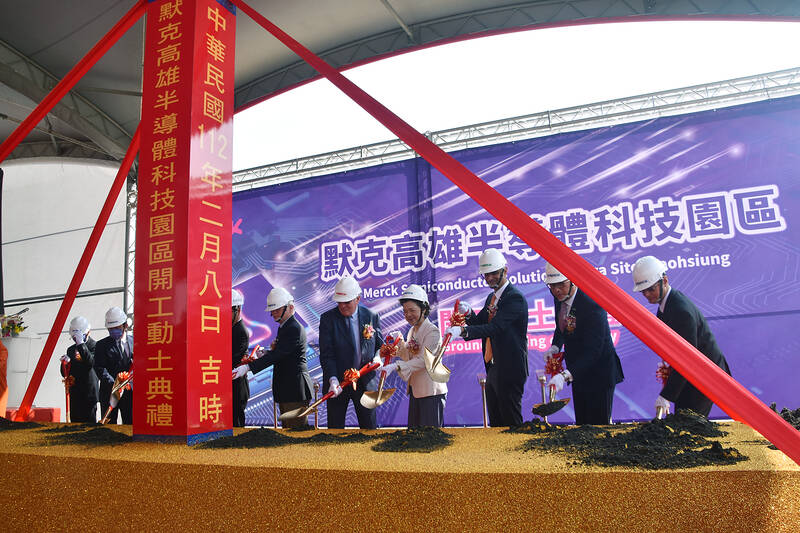Merck Group yesterday held a groundbreaking ceremony for its new semiconductor solutions mega site in Kaohsiung, as the German company looks to bolster supply chain resilience and growth.
The new site marks the second phase of Merck’s investment in Taiwan after the completion in October last year of its phase 1 investment, with the inauguration of a Delivery Systems and Services site in Kaohsiung.
LONG-TERM PLAN

Photo: Su Fu-nan, Taipei Times
Merck plans to invest 500 million euros (US$537 million) in Taiwan over the next five to seven years, with a focus on semiconductors.
The company is implementing a “Level Up” global growth program for its electronics business, aiming to invest more than 3 billion euros by 2025.
The 15-hectare site in Kaohsiung is Merck’s first move to integrate comprehensive product lines from different technology fields, including thin film and specialty gases, into one single location, the company said in a statement.
The investment is an important building block in Merck’s ambition to capture growth opportunities offered by accelerating global demand for innovative semiconductor materials, it said.
The first product lines are expected to become operational by 2025 and will ramp up in phases, Merck said, adding that the investment is expected to create more than 400 jobs.
HUGE MARKET
“Taiwan is a huge market for semiconductor materials and advanced manufacturing. With the establishment of our Semiconductor Solutions Mega Site in Kaohsiung, we aim to work closely with customers to push the technological boundaries in this exciting industry,” Kai Beckmann, a member of the executive board at Merck KGaA and CEO of Merck Electronics, said in the statement.
The new site will host multiple first-time mass-production lines for more innovative semiconductor materials for Merck’s customers, said Anand Nambiar, executive vice president and global head of Merck Semiconductor Materials.
By expanding the company’s capabilities and capacities in Taiwan, it will serve as a powerhouse to speed up customers’ research and development, advance chip manufacturing and build a strong base for boosting supply chain resilience, Nambiar said.

MULTIFACETED: A task force has analyzed possible scenarios and created responses to assist domestic industries in dealing with US tariffs, the economics minister said The Executive Yuan is tomorrow to announce countermeasures to US President Donald Trump’s planned reciprocal tariffs, although the details of the plan would not be made public until Monday next week, Minister of Economic Affairs J.W. Kuo (郭智輝) said yesterday. The Cabinet established an economic and trade task force in November last year to deal with US trade and tariff related issues, Kuo told reporters outside the legislature in Taipei. The task force has been analyzing and evaluating all kinds of scenarios to identify suitable responses and determine how best to assist domestic industries in managing the effects of Trump’s tariffs, he

TIGHT-LIPPED: UMC said it had no merger plans at the moment, after Nikkei Asia reported that the firm and GlobalFoundries were considering restarting merger talks United Microelectronics Corp (UMC, 聯電), the world’s No. 4 contract chipmaker, yesterday launched a new US$5 billion 12-inch chip factory in Singapore as part of its latest effort to diversify its manufacturing footprint amid growing geopolitical risks. The new factory, adjacent to UMC’s existing Singapore fab in the Pasir Res Wafer Fab Park, is scheduled to enter volume production next year, utilizing mature 22-nanometer and 28-nanometer process technologies, UMC said in a statement. The company plans to invest US$5 billion during the first phase of the new fab, which would have an installed capacity of 30,000 12-inch wafers per month, it said. The

Taiwan’s official purchasing managers’ index (PMI) last month rose 0.2 percentage points to 54.2, in a second consecutive month of expansion, thanks to front-loading demand intended to avoid potential US tariff hikes, the Chung-Hua Institution for Economic Research (CIER, 中華經濟研究院) said yesterday. While short-term demand appeared robust, uncertainties rose due to US President Donald Trump’s unpredictable trade policy, CIER president Lien Hsien-ming (連賢明) told a news conference in Taipei. Taiwan’s economy this year would be characterized by high-level fluctuations and the volatility would be wilder than most expect, Lien said Demand for electronics, particularly semiconductors, continues to benefit from US technology giants’ effort

‘SWASTICAR’: Tesla CEO Elon Musk’s close association with Donald Trump has prompted opponents to brand him a ‘Nazi’ and resulted in a dramatic drop in sales Demonstrators descended on Tesla Inc dealerships across the US, and in Europe and Canada on Saturday to protest company chief Elon Musk, who has amassed extraordinary power as a top adviser to US President Donald Trump. Waving signs with messages such as “Musk is stealing our money” and “Reclaim our country,” the protests largely took place peacefully following fiery episodes of vandalism on Tesla vehicles, dealerships and other facilities in recent weeks that US officials have denounced as terrorism. Hundreds rallied on Saturday outside the Tesla dealership in Manhattan. Some blasted Musk, the world’s richest man, while others demanded the shuttering of his